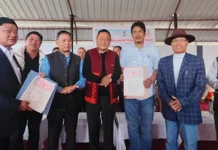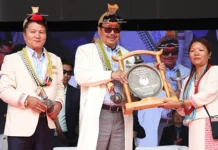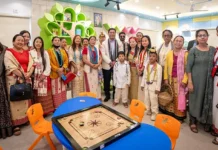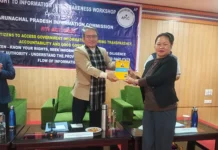RONO HILLS, 18 Nov: The three-day multidisciplinary international seminar on ‘Northeast India and beyond: Past, present and future’ concluded with a renewed commitment to fostering academic engagement on issues central to Northeast India and its broader global connections here on 16 November.
The seminar brought together renowned academicians, researchers, policymakers, and students to engage in critical dialogues surrounding the socio-cultural, political, and developmental landscape of Northeast India in a global context.
The event featured 270 presenters in the hybrid mode, across 12 technical sessions at four venues.
Attending the concluding day of the seminar, MP Tapir Gao emphasised the need to understand the history of the Northeast to meaningfully engage with its present and future. He noted that only a limited number of Indian writers adequately represent the region, which has at times allowed misguided or incorrect narratives to shape perceptions. He urged scholars to challenge such portrayals and guide academic work towards a more accurate and responsible understanding of the Northeast.
Highlighting concerns that certain writings have “kept the region in the dark in terms of development, political, and socioeconomic progress,” he stressed that preserving the communities’ origins, identities, and dialects should remain crucial. He further suggested cautious use of technology.
In his keynote address, Prof Jangkhongam Doungel of Mizoram University emphasised the importance of the unique historical and political scenario of the Northeast, noting that the Northeastern region is independent in its own way and is a ”unique part of India” even with limited representation.
He encouraged academicians and youths to work on issues like border fencing and the Uniform Civil Code, adding that unity in diversity can truly flourish if different communities and ethnic groups follow a uniform code.
RGU Vice-Chancellor (i/c) Prof SK Nayak commended the organisers and participants for their contributions,and encouraged continued academic collaborations to come up with unique research for the betterment of the people and of the nation.
State Planning and Investment Deputy Director Dr Akepi Linggi motivated the scholars to further meaningful research.
Rajiv Gandhi University Research Scholars’ Forum (RGURSF) convener Lokpa Tamang delivered a comprehensive seminar report, highlighting key deliberations, research insights, and collaborative outcomes from the event.
During the closing ceremony, best presenter certificates were distributed to participants by Dr Akepi Linggi. A total of 23 research scholars, in both offline and online modes, were awarded.
Earlier, the inaugural session of the seminar saw the release of a book of abstracts of the papers to be presented.
The RGURSF, since its inception, has been actively engaged in promoting academic excellence and interdisciplinary scholarship at RGU. So far, the forum has organised five national seminars, three national workshops, and two international seminars, contributing significantly to the academic vibrancy of the university.
The seminar was organised by the RGURSF, in collaboration with RGU’s mass communication department.





